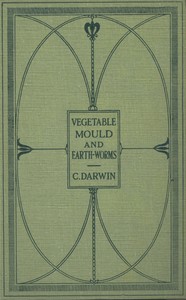The Formation of Vegetable Mould Through the Action of Worms by Charles Darwin
"The Formation of Vegetable Mould Through the Action of Worms" by Charles Darwin is a scientific book published in 1881. Darwin's final scientific work explores how earthworms transform soil through their daily activities. He demonstrates that these humble creatures, working gradually over long periods, create profound changes to the earth's surface. Through decades of observation and experiments—from his own garden to ancient ruins at Stonehenge—Darwin reveals how millions of worms per acre
continuously reshape the ground beneath our feet, making the invisible visible. (This is an automatically generated summary.)
Read or download for free
| How to read | Url | Size | |||
|---|---|---|---|---|---|
| Read now! | https://www.gutenberg.org/ebooks/2355.html.images | 402 kB | |||
| EPUB3 (E-readers incl. Send-to-Kindle) | https://www.gutenberg.org/ebooks/2355.epub3.images | 3.0 MB | |||
| EPUB (older E-readers) | https://www.gutenberg.org/ebooks/2355.epub.images | 3.0 MB | |||
| EPUB (no images, older E-readers) | https://www.gutenberg.org/ebooks/2355.epub.noimages | 201 kB | |||
| Kindle | https://www.gutenberg.org/ebooks/2355.kf8.images | 3.1 MB | |||
| older Kindles | https://www.gutenberg.org/ebooks/2355.kindle.images | 3.1 MB | |||
| Plain Text UTF-8 | https://www.gutenberg.org/ebooks/2355.txt.utf-8 | 373 kB | |||
| Download HTML (zip) | https://www.gutenberg.org/cache/epub/2355/pg2355-h.zip | 3.1 MB | |||
| There may be more files related to this item. | |||||
Similar Books
About this eBook
| Author | Darwin, Charles, 1809-1882 |
|---|---|
| Title |
The Formation of Vegetable Mould Through the Action of Worms With Observations on Their Habits |
| Note | Wikipedia page about this book: en.wikipedia.org/wiki/The_Formation_of_Vegetable_Mould_Through_the_Action_of_Worms |
| Credits | David Price |
| Reading Level | Reading ease score: 61.5 (8th & 9th grade). Neither easy nor difficult to read. |
| Language | English |
| LoC Class | QH: Science: Natural history |
| Subject | Earthworms |
| Subject | Soils |
| Subject | Humification |
| Category | Text |
| EBook-No. | 2355 |
| Release Date | Oct 1, 2000 |
| Most Recently Updated | Nov 5, 2021 |
| Copyright Status | Public domain in the USA. |
| Downloads | 629 downloads in the last 30 days. |
| Project Gutenberg eBooks are always free! | |

